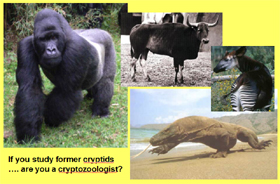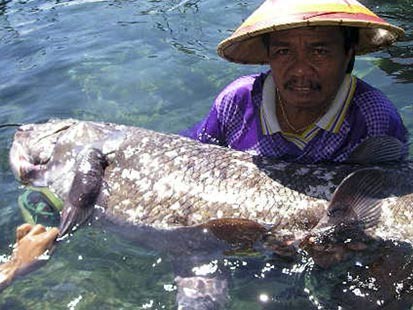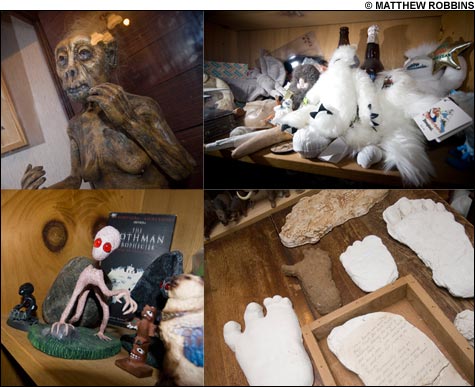
February 22, 2009

One of the most frequent, oft-repeated questions I’m asked is, “How can I become a cryptozoologist?”
That is usually quickly followed by, “How can I study cryptozoology (in high school) (in college)?”
“What kind of volunteer work could I do?” is another one I’m asked.
The answers are anything but simple, as being a cryptozoologist depends on your point of view. There are no credit courses in cryptozoology that are directly linked to a career in cryptozoology. There are no internships out there to learn how to become a cryptozoologist. There is no doctorate in cryptozoology or even a masters degree.

Even Darren Naish’s question above can be answered differently by various individuals, although I’m of the school that learning about new cryptids can be enhanced by studying what I call the “classic animals of discovery” in cryptozoology.
In high school, studying any of the following subjects will assist you with gaining a vocation that is aligned to cryptozoology: biology, zoology, anthropology, psychology (for interviewing), criminal investigations, and so forth. Then you can build on those courses or ones near them for college.
It is about the same for picking a college or unversity. There are none doing anything special with cryptozoology through the length of a two year or four year stay; you have to choose a good college, in general, that will focus your interests.
Yes, I know there are various people who have or are teaching individual or a few courses in cryptozoology, but there is no major, minor, or department in cryptozoology.
The best way to follow an interest, for instance, about the Loch Ness Monster is to study hard, and stay on track to get into a college that has courses on Aquatic Studies or a Marine Mammal program.

With your parents and/or a guidance counselor at your school, you can ask about what good universities exist in your state or area that have an outstanding, for example, Biology Department for general cryptozoology, Aquatic Studies or Marine Sciences for Lake or Sea Monster work, and Anthropology Department for Bigfoot and Yeti research.

You also might wish to think about working or volunteering at a zoo or an aquarium when you can, during middle or high school. Working as a volunteer with a vet or pet rescue agency might be a stepping stone in your career plans.

For example, I’m still looking for a very organized, obsessive volunteer for my cryptozoology museum in Maine who likes to sort through boxes or work on cataloguing the collection. Most people don’t like to do such tasks, as they are boring or not glamorous ~ but write me directly, if you are interested ~ at lcoleman@maine.rr.com Summer is coming.
Taking writing courses or joining your student newspaper could give you practice for turning breaking cryptid sightings into stories, articles and essays.
You can research online places near your home to look into work or volunteer opportunities that will get you closer to becoming a cryptozoologist.

In general, few people in the world work in the field of cryptozoology on a full-time basis. I do, and a couple other people perhaps, but most individuals I know “doing” cryptozoology happen to have another job and squeeze their cryptozoology in on the side.
The truth is, cryptozoology does not really pay much, and you have to scratch by selling books or giving talks, now and then. Some people in documentary filmmaking make good money, but they usually consider themselves as filmmakers or producers, not cryptozoologists.
Most cryptozoologists, unless they are independently wealthy, barely make a living. No grants in cryptozoology are given for folks to do this work. There is a great misunderstandings about when cryptozoologists do need to make money to support their work.

You also have to deal with people threatening you with lawsuits because they ask for attention and then might not like what you write about them. It is a mixed bag.
The rewards in being a cryptozoologist are not financial or media-driven ones, but involve the passionate pursuit of discovering new information on a world of animals yet to be revealed.
Being a cryptozoologist is to be a modern adventurer, but if you are getting into this field to make money, you might be better off going into another field.

Lil’ Bigfoot Cartoon Credit: Cunningham/Pittz
About Loren Coleman
Loren Coleman is one of the world’s leading cryptozoologists, some say “the” leading living cryptozoologist. Certainly, he is acknowledged as the current living American researcher and writer who has most popularized cryptozoology in the late 20th and early 21st centuries.
Starting his fieldwork and investigations in 1960, after traveling and trekking extensively in pursuit of cryptozoological mysteries, Coleman began writing to share his experiences in 1969. An honorary member of Ivan T. Sanderson’s Society for the Investigation of the Unexplained in the 1970s, Coleman has been bestowed with similar honorary memberships of the North Idaho College Cryptozoology Club in 1983, and in subsequent years, that of the British Columbia Scientific Cryptozoology Club, CryptoSafari International, and other international organizations. He was also a Life Member and Benefactor of the International Society of Cryptozoology (now-defunct).
Loren Coleman’s daily blog, as a member of the Cryptomundo Team, served as an ongoing avenue of communication for the ever-growing body of cryptozoo news from 2005 through 2013. He returned as an infrequent contributor beginning Halloween week of 2015.
Coleman is the founder in 2003, and current director of the International Cryptozoology Museum in Portland, Maine.
Filed under Classic Animals of Discovery, Cryptomundo Exclusive, Cryptotourism, CryptoZoo News, Cryptozoologists, Cryptozoology, Forensic Science, Media Appearances, Men in Cryptozoology, Pop Culture, Women in Cryptozoology